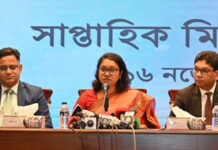‘Enforced disappearances occur in Bangladesh, but not frequently’

Law minister tells the Committee Against Torture of the UN at its 67th session
Though not frequently, enforced disappearances do take place in Bangladesh, Law Minister Anisul Huq admitted on Wednesday in Geneva while defending allegations of human rights violations.
“We do not recognize the proposition that enforced disappearances occur in Bangladesh frequently. Usually, the cases of certain abduction are reported as enforced disappearances,” he told the 67th session of Committee Against Torture (CAT) in Switzerland.
CAT is a United Nations body of human rights experts that monitors implementation of the UN Convention against Torture in the states that are signatory to it.
Under the Code of Criminal Procedure (CrPC), such reports were cognizable offences and the police were obligated to register these as cases, the minister said.
“The government remains committed to make sure that whenever an individual is reportedly missing or unaccounted for, he is rescued and traced with the cooperation of families and friends.
“However, there has been a tendency for quite some time to label all cases of missing with enforced disappearances. This is done with obvious intention of maligning the government and its achievements,” he said.
Anisul was speaking for a second day before the committee and faced a barrage of questions on different alleged human rights abuses apart from enforced disappearances, such as death and torture in custody, protection of victims and witnesses, reprisal against civil society, taking confessional statements forcibly, independence of judiciary, corruption in judiciary, and impunity of law enforcement officials.
Bangladesh submitted its report before CAT on July 23 for the first time since its ratification of the UN Convention against Torture in 1998. The committee reviewed the report on Tuesday and Wednesday, and will put forward suggestions and make recommendations on the human rights issues of concerns.
The law minister is leading a 28-member Bangladesh delegation, including State Minister for Foreign Affairs Shariar Alam, to the review.
‘Govt doing everything it can’
Anisul tried to defend the allegations stating that everything is being done in accordance with the constitution and the relevant laws of Bangladesh.
However, he admitted that things go wrong sometimes and put the blame on individuals rather than the law enforcement organizations.
“On sensitive topics like torture and impunity, it is perhaps no surprise that even proven or convicted criminals and their cohorts would try to stake claims of innocence and victimization at the expense of our state institutions and many able professionals,” he added.
The whole organization cannot be blamed for some “abhorrent” individuals, said the minister, claiming that proper action was taken against those who are proved to be responsible of any wrongdoing.
‘Judiciary independent’
About Bangladesh’s judiciary, he unequivocally stated that the judiciary was completely independent with no interference whatsoever from the government.
Anisul also told the committee that the government was seriously considering to enact a law to protect victims and witnesses after consultations with the stakeholders.
He was also critical of the negative attitude of some in the international community in regard to Bangladesh.
The law minister said that Bangladesh has never shied away from embracing the international obligations that correspond to the legitimate demands and aspirations of the country’s people.
“In Bangladesh, you can count on having a credible, willing and engaged partner, working at enhanced compliance with its Human Rights Treaty obligations,” he stressed.
Anisul also said that Bangladesh wants to draw more international scrutiny for its humanitarian gesture towards the 1.2 million Rohingya people forcibly displaced from Myanmar.









